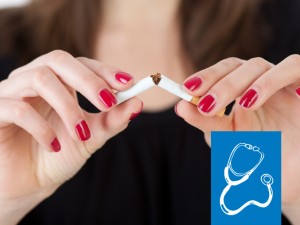Everyone knows smoking is one of the worst things you can do for your health; it kills nearly 5 million people prematurely every year. In this edition of The Waiting Room, Dr Stephen Simonds, a GP who works with Unified Healthcare Group (UHG), provides some advice on how to quit smoking...
Smoking:
- Doubles the risk of heart attack
- Doubles the risk again if you have high blood pressure or high cholesterol
- Increases the risk of heart attack by ten times in women using the contraceptive pill
- Doubles the risk of stroke
- Increases the risk of gangrene by more than five times
In addition, tobacco smoke contains around 69 carcinogenic (cancer causing) substances. These substances cause an increased incidence of cancer in various parts of the body. 90% of lung cancers are attributed to smoking.
Health reasons to quit:
- After 24 hours, carbon monoxide and nicotine is out of your system, and lung function begins to improve
- After two days, your taste and smell start to return
- After two months, blood flow to your hands and feet improves
- After one year, there is a rapid decline in your risk of heart disease
- After ten years, your risk of lung cancer is reduced by half
Smoking is now also socially unacceptable. You are not allowed to smoke in shopping centres, restaurants, bars, schools, hospitals, offices, at beaches or sporting facilities – in other words, wherever there are lots of people around. So it’s not surprising that most smokers have the desire to quit.
There are numerous barriers to quitting smoking. Nicotine is a highly addictive substance, so people have to be sufficiently motivated to quit. Some people are concerned about the effects of quitting. Others may be unwilling due to misinformation, or demoralised because of previous unsuccessful attempts. Some people even argue that therapy (like nicotine replacement patches and gum) is more expensive than smoking in terms of out of pocket expense, without realising the long term savings would be massive.
The following are things you should consider in order to have the best chance of successfully quitting smoking and not relapsing. There are great resources available for people willing to quit, like the Quitline. Seeking advice from your doctor will also be beneficial.
Make the following preparations for quitting:
- Review prior quit attempts. What worked? What didn’t work and may have contributed to relapse?
- Inform family, friends, and co-workers of the plan to quit, and explicitly ask for support
- Start to avoid smoking at home, in the car, and other places where a lot of time is spent
- Identify ‘danger situations’ or activities that may increase the risk of smoking or relapse (e.g. other smokers in the household or workplace, stressful situations, alcohol use, etc)
- Anticipate nicotine withdrawal symptoms, cues to smoking, and ‘danger situations’
- Set a ‘quit date’. Ideally, this should be within two weeks.
Remember, quitting isn’t the treatment; prevention of relapse is
You should stop smoking completely on your quit day and be prepared for the tobacco withdrawal period. The key to successful quitting is to have as much information as possible about what to expect during quit attempts. Ask your doctor for pamphlets and other information. You should know that, even with nicotine replacement and other quit-smoking medications, you may experience withdrawal symptoms, including anxiety, frustration, depression, and often intense cravings for cigarettes. However, if you don’t smoke at all, the withdrawal symptoms often become very manageable within a few weeks.
Remember, quitting isn’t the treatment; prevention of relapse is. Even successful quitters remain at high risk of relapse for at least several years after smoking cessation. Common suggestions to help smokers cope with the early days of quitting include:
- Using chewing gum
- Increasing your activity levels
- Avoiding your ‘danger situations’
The three elements of successful smoking cessation and the prevention of relapse are:
- Social support
- Nicotine replacement therapy
- Skills training or problem solving techniques for your ‘danger situations’ support
Strategies to enhance coping with your ‘danger situations’ may include making lifestyle changes to reduce stress and improve quality of life. You should explore how to minimise the time spent in the company of other smokers. For example, you could negotiate with other household smokers not to smoke within the home or the car. If you need to, ask your doctor to help you with other problem solving techniques for your ‘danger situations’.
Finally, one of the greatest fears that smokers have, especially females, is weight gain once they stop smoking. Once again, the key to successful quitting is to have as much information as possible about what to expect. Weight gain is very commonly associated with cessation of smoking, and is also a major cause of relapse. Weight gain of 1-2kg in the first two weeks is often followed by an additional weight gain over the next four to five months. Even though the benefits of quitting smoking exceed the negative aspects of weight gain, we understand that this may be distressing to many people. However, knowing this, if you implement a healthy diet and active lifestyle, weight gain shouldn’t be an issue and the health benefits are amazing. After all, the single most beneficial thing you can do for your health if you smoke is to quit!
 The Waiting Room looks at of some of the common medical conditions which advisers may come across when dealing with clients.
The Waiting Room looks at of some of the common medical conditions which advisers may come across when dealing with clients.
Unified Healthcare Group serves Australia’s financial services industry by providing a one-stop solution for all medical requirements associated with life insurance claims and underwriting.
Contact or follow the author: Telephone: 1300 558 583 | Website | Email | LinkedIn
















